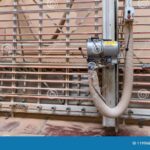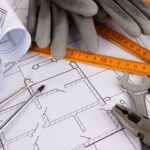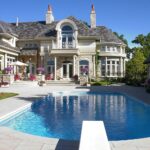Latest Technologies For Exterior Home Construction.
Top Technologies for Exterior Home Construction

1. Insulated Concrete Forms (ICFs)

ICFs are modular concrete blocks that are insulated on all sides. They are used to form the walls of a home, providing a high level of insulation and energy efficiency.

2. Structural Insulated Panels (SIPs)
SIPs are panels that are made of two layers of structural skin, such as oriented strand board (OSB), with a core of foam insulation. They are used to construct the exterior walls of a home, providing a strong and energy-efficient structure.
3. Precast Concrete Panels
Precast concrete panels are large concrete panels that are manufactured off-site and then transported to the construction site. They are used to construct the exterior walls of a home, providing a durable and water-resistant structure.
4. Fiber Cement Siding
Fiber cement siding is a type of siding that is made from a mixture of cement, wood fibers, and sand. It is durable, fire-resistant, and resistant to insects and rot.
5. Metal Roofing
Metal roofing is a type of roofing that is made from steel, aluminum, or copper. It is durable, fire-resistant, and energy-efficient.
6. Solar Panels
Solar panels are devices that convert sunlight into electricity. They can be mounted on the roof of a home to generate renewable energy.
7. Smart Home Systems
Smart home systems are devices that allow homeowners to control their home’s lighting, appliances, and security systems remotely. They can help to improve energy efficiency and convenience.
8. 3D Printing
3D printing is a technology that is used to create three-dimensional objects by layering material. It can be used to create custom building components, such as siding, trim, and roofing tiles.
9. Biodegradable Materials
Biodegradable materials are materials that can break down into natural components over time. They can be used to create sustainable building materials, such as siding, trim, and insulation.
10. Nanotechnology
Nanotechnology is the science of working with matter at the atomic and molecular level. It is being used to develop new building materials that are stronger, lighter, and more energy-efficient.## Latest Technologies For Exterior Home Construction
Executive Summary
The exterior of your home is the first thing that people see, so it’s important to make a good impression. However, traditional exterior construction methods can be time-consuming, expensive, and inefficient. Fortunately, there are now a number of new technologies that can help you create a beautiful and durable exterior that will save you time and money.
Introduction
In this article, we will discuss some of the latest technologies for exterior home construction. We will cover a variety of topics, including:
- Smart siding
- Composite decking
- Metal roofing
- Vinyl windows
- Energy-efficient insulation
FAQ
Q: What are the benefits of using new technologies for exterior home construction?
A: There are many benefits to using new technologies for exterior home construction, including:
- Reduced costs
- Increased durability
- Improved energy efficiency
- Reduced environmental impact
- Faster installation
Q: What are some of the most popular new technologies for exterior home construction?
A: Some of the most popular new technologies for exterior home construction include:
- Smart siding
- Composite decking
- Metal roofing
- Vinyl windows
- Energy-efficient insulation
Q: How can I find a contractor who is experienced in using new technologies for exterior home construction?
A: The best way to find a contractor who is experienced in using new technologies for exterior home construction is to ask for recommendations from friends or family members. You can also search online for contractors in your area who specialize in this type of work.
Smart Siding
Smart siding is a type of siding that is made from a variety of materials, including:
- Fiber cement
- Vinyl
- Metal
- Composite wood
Smart siding is designed to be more durable and energy-efficient than traditional siding materials. It is also resistant to fire, insects, and rot.
Important Features of Smart Siding:
- Durability: Smart siding is designed to withstand extreme weather conditions, including high winds, hail, and snow.
- Energy efficiency: Smart siding can help to reduce your energy bills by insulating your home and reflecting heat away from the sun.
- Resistance to fire, insects, and rot: Smart siding is treated to resist fire, insects, and rot, which can help to extend the life of your home.
- Low maintenance: Smart siding requires very little maintenance, such as painting or staining.
- Variety of styles and colors: Smart siding is available in a variety of styles and colors to complement any home.
Composite Decking
Composite decking is a type of decking that is made from a combination of wood fibers and plastic. Composite decking is designed to be more durable and low-maintenance than traditional wood decking. It is also resistant to rot, insects, and fading.
Important Features of Composite Decking:
- Durability: Composite decking is extremely durable and can withstand heavy foot traffic and extreme weather conditions.
- Low maintenance: Composite decking requires very little maintenance, such as staining or sealing.
- Resistance to rot, insects, and fading: Composite decking is treated to resist rot, insects, and fading, which can help to extend the life of your deck.
- Variety of styles and colors: Composite decking is available in a variety of styles and colors to complement any home.
- Eco-friendly: Composite decking is made from recycled materials, which can help to reduce your environmental impact.
Metal Roofing
Metal roofing is a type of roofing that is made from a variety of metals, including:
- Steel
- Aluminum
- Copper
- Zinc
Metal roofing is designed to be more durable and energy-efficient than traditional roofing materials, such as asphalt shingles. It is also resistant to fire, insects, and rot.
Important Features of Metal Roofing:
- Durability: Metal roofing is extremely durable and can withstand high winds, hail, and snow.
- Energy efficiency: Metal roofing can help to reduce your energy bills by reflecting heat away from the sun and insulating your home.
- Resistance to fire, insects, and rot: Metal roofing is non-combustible and resistant to insects and rot, which can help to extend the life of your roof.
- Low maintenance: Metal roofing requires very little maintenance, such as painting or staining.
- Variety of styles and colors: Metal roofing is available in a variety of styles and colors to complement any home.
Vinyl Windows
Vinyl windows are a type of window that is made from a durable plastic material called polyvinyl chloride (PVC). Vinyl windows are designed to be more energy-efficient and low-maintenance than traditional wood or aluminum windows. They are also resistant to rot, insects, and fading.
Important Features of Vinyl Windows:
- Energy efficiency: Vinyl windows are very energy-efficient and can help to reduce your energy bills by insulating your home and reducing air leaks.
- Low maintenance: Vinyl windows require very little maintenance, such as painting or staining.
- Resistance to rot, insects, and fading: Vinyl windows are treated to resist rot, insects, and fading, which can help to extend the life of your windows.
- Variety of styles and colors: Vinyl windows are available in a variety of styles and colors to complement any home.
- Affordable: Vinyl windows are a relatively affordable option for new windows.
Energy-Efficient Insulation
Energy-efficient insulation is a type of insulation that is designed to reduce heat loss and gain in your home. Energy-efficient insulation can be made from a variety of materials, including:
- Fiberglass
- Cellulose
- Polystyrene
- Mineral wool
Important Features of Energy-Efficient Insulation:
- Reduced heat loss and gain: Energy-efficient insulation can help to reduce heat loss in the winter and heat gain in the summer, which can help to reduce your energy bills.
- Improved comfort: Energy-efficient insulation can help to improve the comfort of your home by reducing drafts and cold spots.
- Reduced environmental impact: Energy-efficient insulation can help to reduce your environmental impact by reducing your energy consumption.
- Variety of products and applications: Energy-efficient insulation is available in a variety of products and applications to meet the needs of any home.
- Government incentives: There are a number of government incentives available to help you save money on energy-efficient insulation.
Conclusion
The latest technologies for exterior home construction offer a number of advantages over traditional methods. These technologies can help you to create a home that is more durable, energy-efficient, and low-maintenance. If you are planning to remodel or build a new home, be sure to consider using these technologies.
Keyword Tags
- Exterior home construction
- Smart siding
- Composite decking
- Metal roofing
- Vinyl windows
- Energy-efficient insulation














Recent Comments
A WordPress CommenterSays
Hi, this is a comment. To get started with moderating, editing, and deleting comments, please visit the Comments screen in…
adminSays
Yep, that worked. Thanks